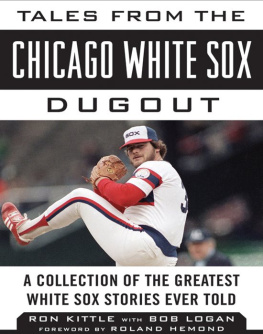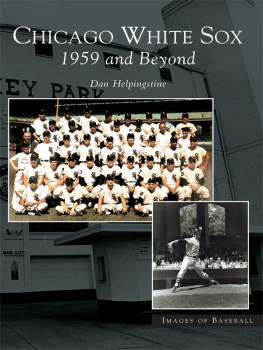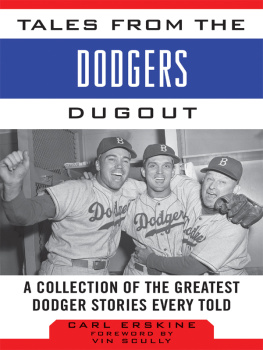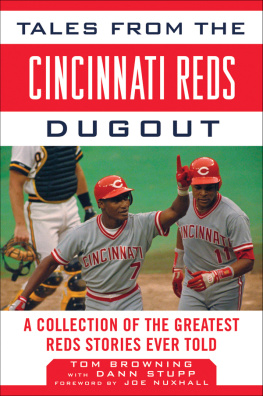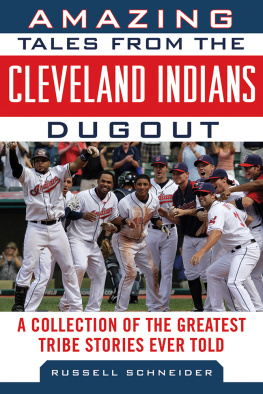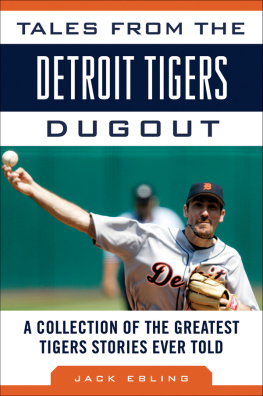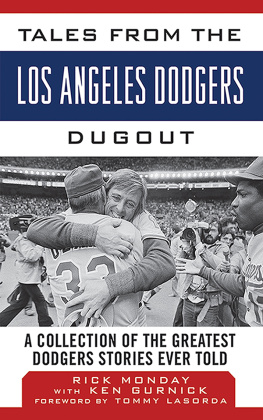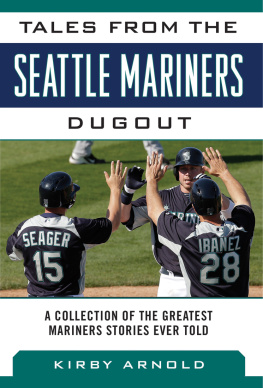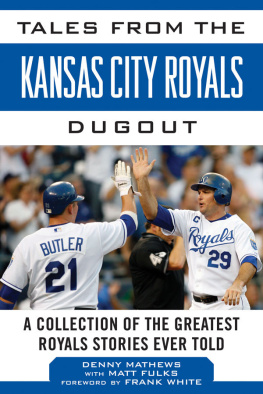

Copyright 2005, 2013 by Ron Kittle and Bob Logan
All Rights Reserved. No part of this book may be reproduced in any manner without the express written consent of the publisher, except in the case of brief excerpts in critical reviews or articles.
All inquiries should be addressed to Sports Publishing, 307 West
36th Street, 11th Floor, New York, NY 10018.
All photos courtsey of Ron Kittle.
Sports Publishing books may be purchased in bulk at special discounts for sales promotion, corporate gifts, fund-raising, or educational purposes. Special editions can also be created to specifications. For details, contact the Special Sales Department, Sports Publishing, 307 West 36th Street, 11th Floor, New York, NY 10018 or sportspubbooks@skyhorsepublishing.com.
Sports Publishingis a registered trademark of Skyhorse
Publishing, Inc., a Delaware corporation.
Visit our website at www.sportspubbooks.com.
10 9 8 7 6 5 4 3 2 1
Library of Congress Cataloging-in-Publication Data is available on file.
ISBN:978-1-61321-218-9
Printed in the United States of America
For my wife, Laurie, and my children, Hayley and Dylan, and the rest of my family and friends for their continued support through the good swings and bad swings and many ups and downs of my career. And to the late James W. Kittle, my father, for never letting me forget where I came from and how hard I had to work to just be a little above average. And to the wonderful people I have met through my years in baseballthey will never be forgotten.
R.K.
Some of the best times in my 40-plus years covering Chicago sports were spent on the South Side, trying to figure out what the White Sox were upor downto. Im glad that Jerry Reinsdorf and Eddie Einhorn kept alive the unbroken tradition of American League baseball in this toddlin town. Thanks to Nancy Faust, who made Sox fans bellow Yes! Yes! to Na, Na with her marvelous music, and to Roland Hemond and Bob Grim, a couple of all-around good guys.
B.L.
F OREWORD
Note: Roland Hemond long ago proved the exception to Leo Durochers adage Nice guys finish last. Hemond is one of baseballs certified Good Guys and sharpest minds. He was general manager of the Chicago White Sox in 1983 and deserves much of the credit for building a team that confounded the experts when it won and had fun, all in the same season.
Fun really was the signature of the 1983 White Sox. They got together on the road, not just to talk baseball, but to have some laughs. Jerry Koosman was a major factor in keeping everybody loose. So was Greg Luzinski, with his dry sense of humor. Marc Hill was the resident clubhouse prankster, ably assisted by Tom Paciorek and Dennis Lamp. The quiet guys, like Harold Baines and Vance Law, didnt add much to the frivolity, but they shared the enjoyment with a club where everybody got along, including Manager Tony La Russa and his outstanding coaches.
Ron Kittle was one of the best at having fun, especially for a rookie. He looked like hed been around forever, even though 83 was his first full year in the majors. Rons refreshing personality and ability to deliver big hits in the clutch played a huge role in the way the White Sox were able to shake off a slow start and come on strong to win their division by 20 games.
Most fans still are unaware of what Kittle went through to make his big-league dream come true. He showed me real courage and perseverance in overcoming spinal surgery and other injuries to earn a second chance with the White Sox, after being told hed never play baseball again. For me, the biggest thrill of the 1983 All-Star game was the fabulous standing ovation Ron got from that jam-packed Comiskey Park crowd. Im pleased that Ron Kittle and Bob Logan, one of Chicagos most respected sportswriters, have combined to tell this story of a player and a team that wouldnt quit.
R OLAND H EMOND
P REFACE
On the morning of October 2, 1982, I was a sleepy Chicago Tribune sportswriter, starting an unusual day in the inflated gasbag known to Minneapolis fans as the Hubert H. Humphrey Metrodome. Bears coach Mike Ditka later hung a better label on this sorry excuse for a big-league stadiumthe Rollerdome.
The White Sox had been sentenced to play the Twins in a rare morning baseball game there, because Illinois and Minnesota were to renew their Big Ten football rivalry that evening on the same turf.
Little did I suspect that a memorable moment in Chicago sports history would enliven the otherwise forgettable Sox-Twins clash. A Sox rookie named Ron Kittle launched his first big-league homer off Twins ace Frank Viola. I dont even remember who won the game, but before long, this intriguing newcomer led first the South Side and then all of Chicago toward an electric, if totally unexpected, ride to a spot fans hadnt glimpsed for yearsthe winners circle.
Kittles ability to blend baseball-bashing power with charismatic charm soon took the Windy City by storm. He emerged as a notable, quotable member of the 1983 Sox team that splashed the words Winnin Ugly across our sports pages in bold headlines. The youngster from Northwest Indiana became an overnight sensation, joshing about his towering homers atop Comiskey Parks roof with a brand of self-deprecating humor, soon dubbed Kittleisms, that made him a media and fan favorite.
Along with everybody else, except opposing pitchers, I savored Kittys meteoric rise to stardom, because he had fun playing baseball and made it equally enjoyable to watch and write about. Not until now, when Ron asked me to help tell tales from his remarkable career in this book, did I begin to understand the price he paid for fame. Its an American success story that I believe should be read by every boy or girl with a dream.
B OB L OGAN
1
H ARD R OAD
TO THE T OP
It Takes Iron Will, Plus Skill
A LL IN THE F AMILY
Its true I always thought I could do better if I worked a little harder. That unquenchable spirit, if thats what you want to call it, came from my Dad, James Slim Kittle. He pushed himself to the limit every day on the job until he was as hard as the iron and steel he worked with. With him, there were no excuses. The way he brought all of us kids up, there was no chance I could accept failure. I think I did it more for him than for myself, but I was not going to let an injury stand in my way.
N O S OFT T OUCHES
It never occurred to me to raise my hand to my dad, even though all of us kids got some severe whippings when we were younger. Nowadays, it probably would be considered child abuse. Finally, when I was a senior in high school, I wrecked his car accidentally, and I thought he was going to backhand me or punch me. I grabbed his hand, because I wasnt going to let that happen anymore. I want to make it clear that my dad was not a bad man. We respected him, and he wanted us to be disciplined kids.
Work was the first priority for the Kittles, but I found time to play baseball, football and basketball, ride my bike and do the things most kids did in that much more innocent world I grew up in. But while my friends were hanging out on Miller Beach by the Indiana Dunes, having summer fun, I was running sprints with my Gary Wirt High School teammate, Jack Sauer. He won our first races by 10 yards, but I kept coming, and before long, I was beating him. Thats the way it was done in our family, no matter what the job wasdo it right and get it done.
Next page
